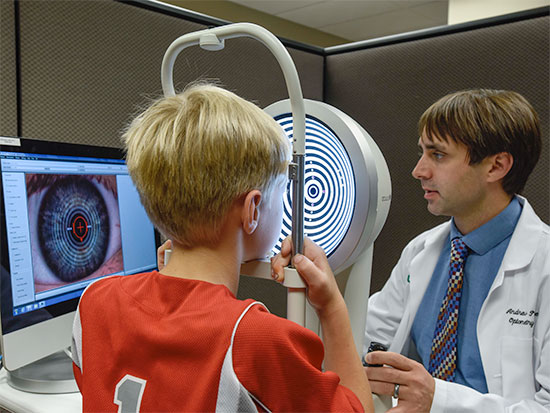 Andrew Pucker, O.D., Ph.D, conducts myopia testing to determine the best treatment for this young patient. For roughly one-third of Americans, myopia — otherwise known as nearsightedness — is a common, correctable vision impairment that impacts the way one sees everyday objects at distances. In extreme cases, these people may also have trouble seeing up close.
Andrew Pucker, O.D., Ph.D, conducts myopia testing to determine the best treatment for this young patient. For roughly one-third of Americans, myopia — otherwise known as nearsightedness — is a common, correctable vision impairment that impacts the way one sees everyday objects at distances. In extreme cases, these people may also have trouble seeing up close.
As myopia cases are on the rise, faculty at UAB’s School of Optometry are researching ways to prevent and slow the progression of myopia through cutting-edge technology, and are treating people in the Myopia Control Clinic at UAB Eye Care. Research specifically focuses on understanding the mechanisms leading to myopia and on helping children who may be predisposed to myopia, or diagnosed with it, better understand how to prevent or slow the condition.
Myopia often occurs from the eye’s growing too long in comparison to the rest of its parts, which causes images to be focused in front of the retina instead of on the retina itself. Scientists cannot pinpoint exactly how myopia develops or progresses; but contributing factors range from genetic predisposition to children’s spending less time outdoors, or more time on education. Even without myopic parents, children are susceptible to developing the condition.
“Through cornerstone National Institutes of Health clinical trials conducted within the School of Optometry over the last two decades, we have been able to deduce that nearsightedness tends to grow, with the average myopic growth in children spanning nine years,” said Katherine Weise, O.D., professor at the School of Optometry. “New myopic patients and younger patients will benefit the most from treatment since their eyes will continue to grow and intervention treatments can be completed as needed.”
Am I myopic?
How do you know if you or your child is myopic? Common signs and symptoms include:
- Blurred vision when looking at distant objects and signs
- For children: the need to be closer to the front of the classroom to focus or sitting closer to the television or computer to see
- Eye strain
- Headaches associated with focusing on distant objects and signs
- Difficulty when driving
What is the cure?
While there is not a cure for myopia, Andrew D. Pucker, O.D., Ph.D., says there are three key ways to slow myopia progression, all of which are offered in the Myopia Control Clinic. “People should consider myopia control because higher amounts of myopia can lead to increased risk of developing vision-threatening conditions like cataracts, glaucoma and retinal detachment.”
- Orthokeratology contact lenses: Worn just during sleep, these corneal reshaping contact lenses temporarily change the shape of the cornea so that the patient can see all day without using glasses or traditional contact lenses. Research shows these lenses may also slow myopia progression by about 50 percent.
- Soft bifocal contact lenses: These lenses help people see up close and far away by bending light that enters the eye in a beneficial way. These work in a manner similar to orthokeratology contact lenses, and they also slow myopia progression by about 50 percent.
- 0.01 percent atropine: Potentially the most effective treatment of the three, 1 percent atropine is an eye drop that makes light seem bright because it makes the pupil increase in size. Low-dose atropine (0.01 percent) has been shown to slow myopia progression by about 60 percent without increasing the pupil size or decreasing near vision dramatically. The UAB School of Optometry was one of only 10 sites across the country selected to study this treatment for the National Institutes of Health. Weise and Michael Repka, M.D., Johns Hopkins Medicine, are national protocol co-chairs. Recruitment is scheduled to begin in March, and those interested in participating can call UAB Pediatric Optometry Research at 205-996-0203.
Those in need of treatment should contact the Myopia Control Clinic at UAB Eye Care, now accepting patients. Learn more by calling 205-975-2020.
